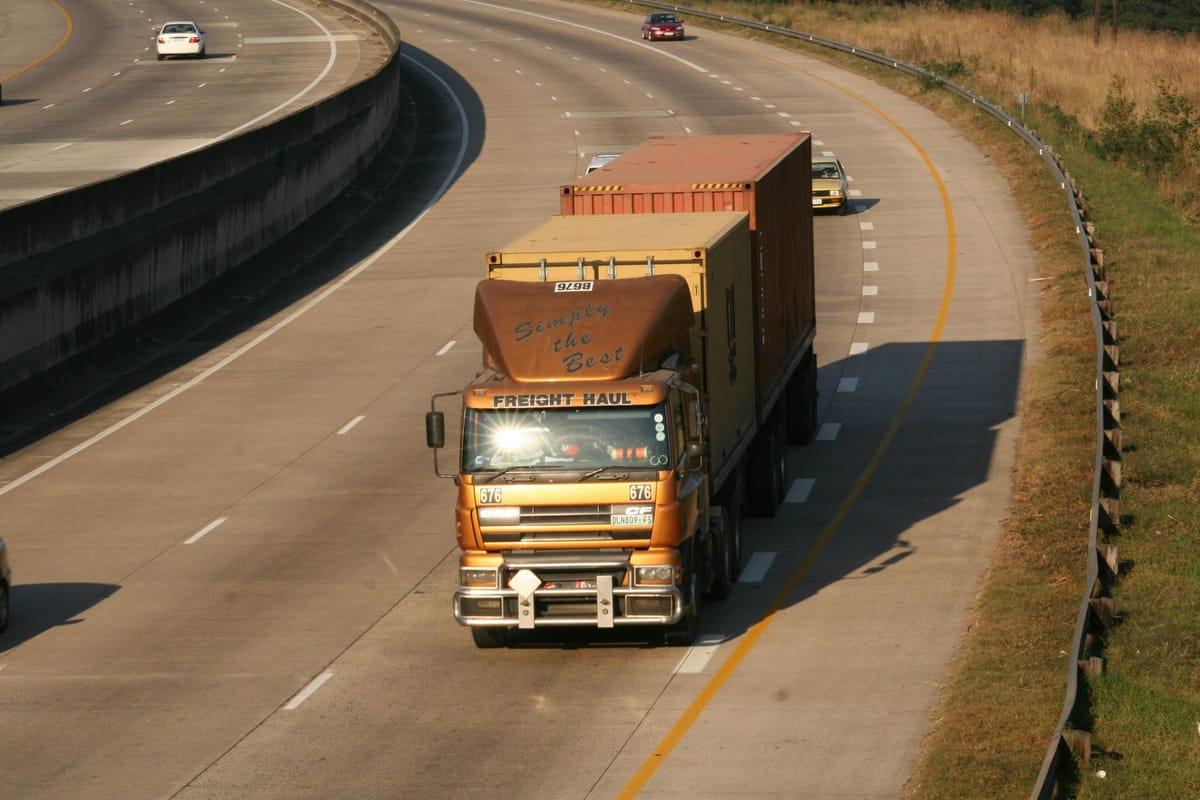🎯 Recruitment isn’t broken, retention is
Plus: DOT drops limiter rule | Lawmakers want HOS rules changed

Driver shortage: true or false? For the Inside Lane's inaugural webinar, we heard from experts about trucking recruitment, retention and the next generation of talent in our recent webinar. Catch the key takeaways in today’s newsletter—and stay tuned for details on our next webinar, coming soon.
Plus, the Department of Transportation has released a "pro-trucker package" that rolls back some regulations, while two lawmakers are calling on the FMCSA to change its process for HOS waivers.
And, believe it or not, it's actually possible to make a profit in a freight downturn. We're featuring a podcast where one fleet exec shares his tips.

5 Takeaways from The Inside Lane's Driver Recruitment & Retention Webinar
Driver turnover continues to drain time, money and talent from the industry. On June 18, The Inside Lane hosted a live webinar that brought together top industry voices for a frank discussion on what’s really driving the recruitment and retention crisis.
Panelists Lewie Pugh, EVP of OOIDA, Lindsey Trent, president and co-founder of Next Generation in Trucking Association, and Robert Pierson, VP of driver recruiting at Mesilla Valley Transportation, didn’t hold back.
The trio offered practical, hard-earned insights for leaders how are ready to rethink how they attract and keep drivers. Here’s what you need to know. —Bianca Prieto
1. The industry has failed to evolve its pitch.
The trucking world still hasn’t made real strides in promoting itself as a modern, desirable career, Pugh shared. He pointed out that when he joined in 1994, trucking had more public respect than it does today—and that the profession hasn’t improved much since. Outdated public perceptions and internal stagnation are holding the industry back.
2. There's a lack of enthusiasm.
Pierson, who has onboarded an estimated 20,000 drivers in his career, argued that too many people in the industry aren’t selling the job with pride. “If we can't get excited about our own industry, how do we expect it to come from any other place?” he asked.
3. Turnover, not shortages, is the real crisis.
Pugh dismantled the “driver shortage” myth, calling it a decades-old tactic used to depress wages. “There’s no driver shortage. There’s never been a driver shortage,” he said. He pointed out that hundreds of thousands of CDLs are issued annually, but drivers don’t stay—often because of what he described as exploitative conditions, inconsistent pay and disrespect on the job.
4. Retention starts well before day one.
Pierson emphasized that recruiting teams must understand the full scope of a driver’s motivation—whether it’s geography, respect or equipment quality. He said successful onboarding happens when recruiters, dispatchers and fleet managers are aligned and honest. “If you don’t deliver on promises made in the first 90 days, your turnover rate will show it.”
5. Gen Z wants in, but the industry has to show up.
Trent highlighted that younger generations are purpose-driven and tech-fluent. She cited data showing students are far more likely to enter trucking when the industry engages directly with schools. “It takes industry involvement to really help young people know about the trucking industry and learn about the trucking industry,” she said.
The lessons for executives? Take ownership. Update your messaging to reflect the reality Gen Z wants—purpose, growth and tech. Treat onboarding like a sales process, not a formality. Align your ops, recruiting and dispatch teams to deliver a consistent experience. Engage directly with schools and training programs in your markets. And if your company isn't proud to promote trucking as a career? Fix what's broken until you are. Get more insights by watching the full video.
Stay tuned for the next Inside Lane webinar in early August, where we will discuss the advantages and disadvantages of tech in trucking.

The shift to electric trucks could stall in the U.S.
The math is in: By 2030, the total cost of ownership for battery-electric trucks will actually be lower than that of diesel trucks. That's regardless of the kind of subsidies that might be offered for EVs. Those cost savings can ripple through the supply chain all the way to consumers.
The question is, according to Chris Busch of Energy Innovation, do we have the federal policy in place to continue momentum on EV transitions? "Federal rollbacks won’t halt the global EV shift, but they could stall U.S. progress at a critical moment."
Why this matters: So far, the Trump administration has focused on regulatory rollbacks while deprioritizing electrification initiatives. The policy shift could ease requirements for fleet owners, but it may also slow progress toward lower emissions and put fleets that have adopted EVs in limbo.
Get more details at Forbes.

CANCELED CDLS: 1,000+ CDLs revoked in connection with smuggling
HEAD HONCHOS: Who will lead the FedEx Freight spinoff?
STOCK EXCHANGE: Driverless truck software company Plus goes public
FRAUD SCHEME: Man accused of stealing diesel and reselling at below-market rates

"If you're one of the carriers that has survived the last 3.5 years, when 240,000 carriers have gone out of business, then you can pretty much say that you're doing something right." —Jamie Anderson, Daystar Transport
No doubt the freight market has been tough for several years. The motor carriers that have kept on truckin' have their go-to strategies in place. Anderson shared his insights into running a profitable OTR trucking business along with other strategies he believes have set his business apart. Listen to his interview here.

DOT drops speed-limiter rule in new trucker-friendly plan
The Department of Transportation has released a "pro-trucker package" focused on improving working conditions for truck drivers. The package includes millions in funding for truck parking, the withdrawal of a proposed rule that would have mandated speed limiters on heavy-duty vehicles and pilot programs to examine hours-of-service regulations.
Why this matters: The industry unanimously agrees on the need for more parking spaces to create safer roads and better conditions for truckers. But on the issue of speed limiters, trucking is divided. Safety advocates and groups such as the American Trucking Associations have voiced support for the technology, while the Owner-Operator Independent Drivers Association contends that speed limiters can actually reduce safety by creating broad speed differences. (CDL Life)
Lawmakers to FMCSA: Issue HOS waivers before disaster strikes
Two House Republicans are calling for a change in how the Federal Motor Carrier Safety Administration grants hours-of-service waivers in the wake of natural disasters. The lawmakers want the agency to consider easing HOS rules before emergencies occur, rather than reacting after the fact.
Why this matters: The way the FMCSA grants HOS waivers today is typically after a disaster has already impacted a region, and then trucks can haul fuel or other relief supplies to the area. A proactive approach to waiving HOS, before a forecasted hurricane for example, could help position supplies and aid in recovery efforts. (Overdrive)
Werner's $100M jury nuclear verdict gets reversed
Werner Enterprises has won a long, drawn-out legal battle. The Texas Supreme Court sided with the motor carrier and reversed a $100 million nuclear verdict against the company. The case dates back to a 2014 fatal crash, when a pickup truck collided with a Werner tractor.
Why this matters: Multi-million-dollar nuclear verdicts against trucking companies drive up expenses and insurance costs for not just that particular carrier, but industry-wide. The court siding with Werner could set the precedent for future cases and massive jury awards against trucking companies. (Transport Topics)

Cyber attack hits Estes' forwarding division
Estes Forwarding Worldwide, a subsidiary of LTL carrier Estes Express Lines, suffered a cyber attack. The incident happened in late May and is being reported now. The forwarding group was able to restore operations within a few hours of the attack, but this isn't Estes' first run-in with a cyber incident. In 2023, the carrier was targeted in a cyberattack that created an outage in its IT infrastructure.
Why this matters: Fleet owners, whether they run small operations or big trucking fleets, need to ensure systems are up to date with any necessary patches in place. The possible risks if they don't: stolen data or a halt in operations, leading to lost business. (FreightWaves)
Thanks for reading today's edition! You can reach the newsletter team at editor@theinsidelane.co. We enjoy hearing from you.
Interested in advertising? Email us at newslettersales@mvfglobal.com
The Inside Lane is curated and written by Shefali Kapadia and edited by Bianca Prieto.





Comments ()